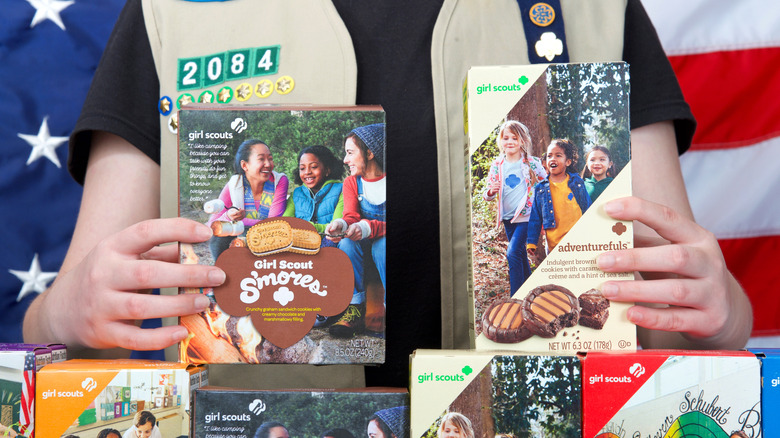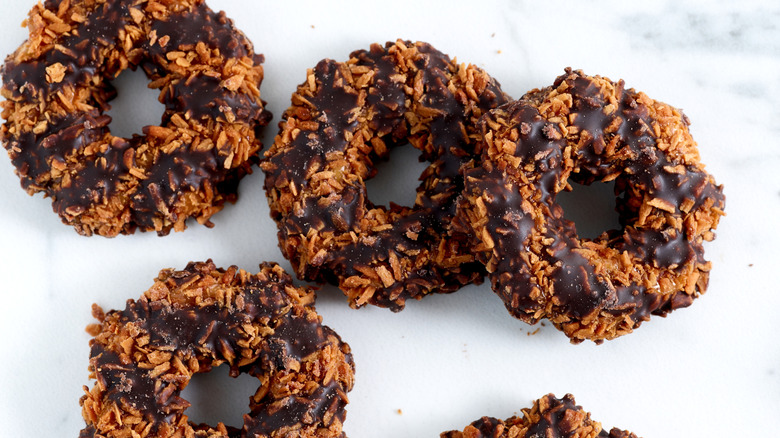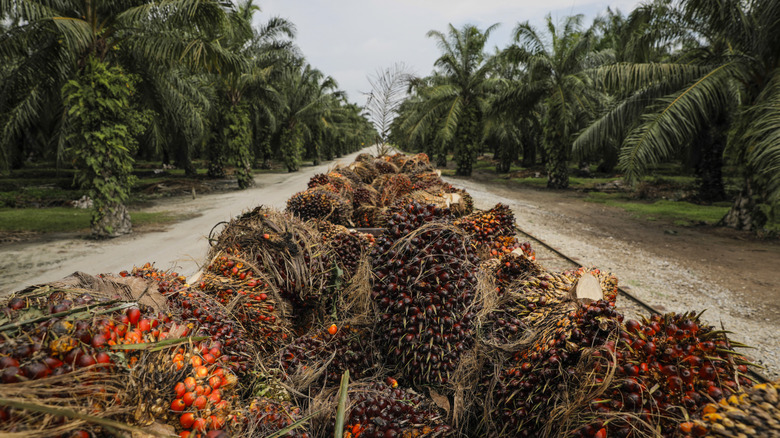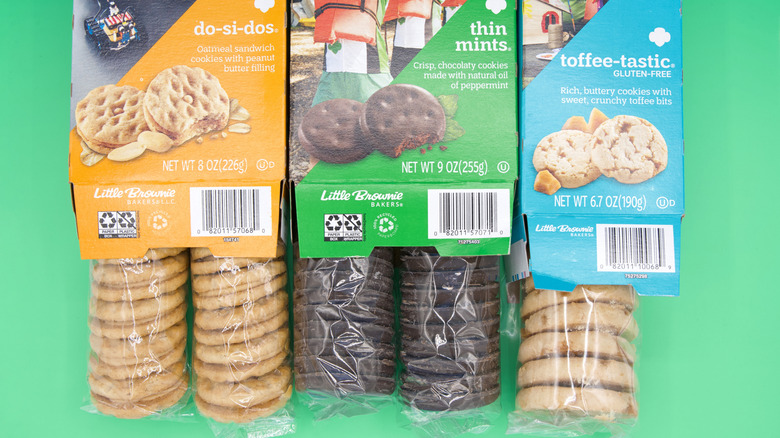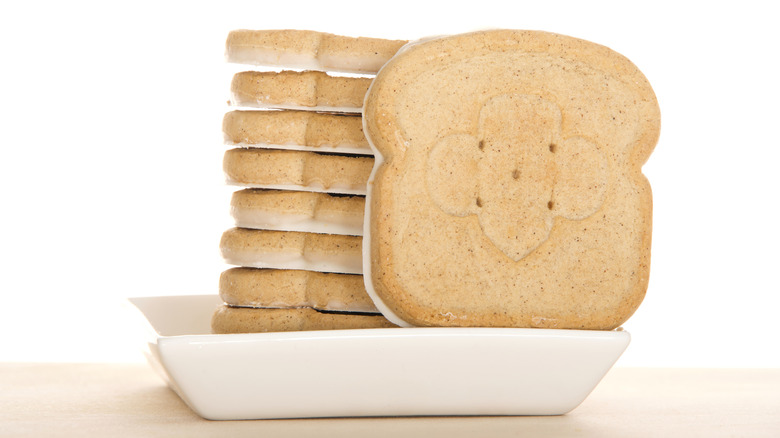The Biggest Scandals In Girl Scout Cookie History
Founded in 1912 by Juliette Gordon Low, Girl Scouts of the USA (GSUSA) began as a small troop dedicated to teaching young girls practical skills. At a time when women couldn't vote and were expected to adhere to traditional roles, the organization offered a space for girls to develop community, confidence, and independence. Over the decades, Girl Scouts grew into a nationwide movement, empowering millions through outdoor adventures, diversity campaigns, and educational programs.
Of course, we can't forget about the Girl Scouts' iconic cookies. From fans expressing excitement over new cookie releases to hoping that a discontinued favorite will return, the nonprofit has captivated cookie lovers nationwide for over 100 years. What started as a high school fundraising effort evolved into a cultural phenomenon, with Girl Scout cookies becoming a household name and a key part of the institution's identity.
Beyond its famous cookies, Girl Scouts has built a strong reputation for fostering entrepreneurship in young girls. Its marketing strategies (including limited-edition cookie flavors and popular snack collaborations with companies like Yoplait and General Mills) have kept the organization relevant in an ever-changing market. Despite Girl Scouts' legacy of empowerment and success, the group and its famous cookies have seen their share of controversy, including cases of alleged embezzlement and more recent concerns over potential toxins.
Girl Scouts allegedly made misleading claims about trans fats in its cookies
For years, Girl Scouts has claimed its cookies contain no trans fats, but past labeling practices may have been misleading. Under FDA guidelines, foods with less than 0.5 grams of trans fat per serving could be labeled as having zero grams of trans fats, even if they contained partially hydrogenated oils. This allowed food manufacturers, including Girl Scouts, to manipulate serving sizes to meet labeling requirements. This means cookies like Thin Mints, Tagalongs, and Samoas once contained small amounts of trans fats while being labeled as trans fat-free.
This concern, however, is outdated. In 2015, the FDA began phasing trans fats out of the U.S. food supply after determining that they were broadly unsafe. Manufacturers nationwide were required to comply fully by January 1, 2020, meaning that Girl Scout cookies no longer contain hydrogenated oils today. While the organization has always followed legal guidelines, given its reputation for integrity, Girl Scouts might have benefited from greater transparency about the cookies' contents. The cookies, of course, still contain natural trans fats like butter and milk, but these are not affected by the FDA ban.
Girl Scouts was called out for unsustainable environmental practices and child labor
Girl Scouts has faced repeated criticism for using palm oil in the nonprofit's cookies, an ingredient linked to deforestation and child labor. Despite years of advocacy from members within the institution — including two Girl Scouts who launched a petition in 2011 after learning about palm oil's environmental impact — Girl Scout cookies still contain palm oil. Investigations have found that the palm oil supply chain often involves unsustainable practices that contribute to rainforest destruction, endangering species like orangutans. Additionally, a 2020 report uncovered child and forced labor in the palm oil industry, raising ethical concerns about the sourcing of this ingredient.
This controversy is particularly damaging because it contradicts Girl Scouts' values of ethical decision making, responsibility, and supporting local communities. However, the nonprofit has taken steps toward more sustainable routes. Girl Scouts has pledged to source "sustainable" palm oil through the Roundtable on Sustainable Palm Oil (RSPO), though critics argue that this certification does not fully prevent environmental harm or labor exploitation.
One reason why Girl Scouts relies so heavily on palm oil is because the organization needed a replacement for hydrogenated oils and trans fats after the FDA determined them to be unsafe. Given Girl Scouts' emphasis on empowering young girls and fostering social responsibility, the organization's unwillingness to fully address these concerns has led to growing frustration among members and activists.
Girl Scout leaders have stolen from the organization multiple times
In 2018, Patricia Cascione, a former Girl Scouts troop treasurer in Santa Clarita, California, was charged with embezzling more than $58,000 from Girl Scouts of the USA's troops and a Girl Scouts service unit. Cascione volunteered as a treasurer for various LA County Girl Scout troops over the course of 20 years. In 2019, she was found guilty of embezzling over $93,000 over a four-year period from GSUSA and the Beverly Hills Cancer Center. The case concluded with Cascione pleading no contest to the charges, resulting in a sentencing of one year of jail time, followed by five years of probation — in addition to an order to repay the stolen funds.
This incident is among several in which Girl Scout leaders have been accused of misappropriating funds. In 2023, a Girl Scout troop treasurer from Delaware was arrested for allegedly stealing over $12,000 from her former troop. Similarly, a former Girl Scout troop leader in Oklahoma was accused of embezzling more than $5,000 from her troop back in 2010. The funds taken were earned from cookie sales and donations intended to honor a Girl Scout leader who had died. Though the motivations varied, these repeated incidents display the need for more financial checks and balances within Girl Scout troops.
A Girl Scout leader was accused of stealing $26,000 worth of cookies
Money isn't the only asset being stolen from the Girl Scouts. In 2017, Leah Ann Vick, a 26-year-old Girl Scout troop leader from Kentucky, was indicted for allegedly stealing over $26,000 worth of Girl Scout cookies. Over the course of a few months, Vick reportedly collected more than 6,000 boxes. However, when the time came to disperse the cookies to troops and collect the proceeds, Vick was unresponsive, leading to failed attempts by the organization to recover the funds.
It was unclear whether Vick had kept the cookies, sold them herself and kept the cash, distributed some to troops and pocketed the proceeds, or a combination of all three. This prompted the nonprofit to involve law enforcement, resulting in her indictment on felony theft charges. The outcome of the legal proceedings remains uncertain from available reports. Girl Scout cookie sales are essential to the financial health of a troop, as the profits allow the young girls to fund educational trips and events.
Girl Scouts is being sued over alleged toxins in its cookies
In March 2025, Girl Scouts of the USA faced a class-action lawsuit alleging that its cookies contain harmful substances, including heavy metals and pesticides. This lawsuit, filed by New York resident Amy Mayo, asks for $5 million in damages and for future cookie packaging to clearly disclose the discovered substances. The lawsuit references a 2024 study conducted by Moms Across America and GMO Science, which tested several varieties of cookies. The study reportedly found traces of heavy metals such as arsenic, lead, and mercury in all samples. The study also found glyphosate, a type of pesticide, in 13 cookies.
Girl Scouts responded by affirming that the organization's cookies are safe and comply with all food safety regulations. The organization noted that trace amounts of heavy metals and glyphosate can occur naturally and are commonly found in many varieties of food products. Food safety experts, however, have questioned the study's validity, citing its small sample size and lack of peer review. Time will tell the results of the lawsuit, but rest assured, the cookies still follow FDA guidelines.
